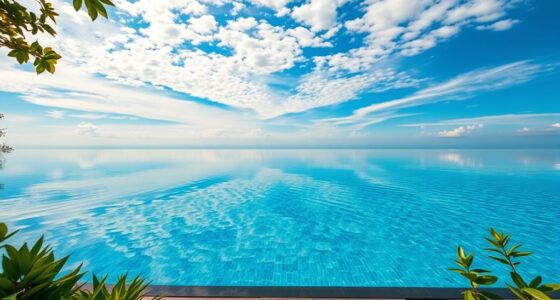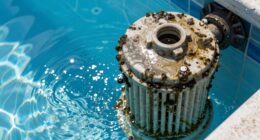Saltwater systems for infinity pools offer a softer, more natural swimming experience and require less chemical handling, making them eco-friendly. However, they can cause corrosion of certain equipment, increase maintenance needs, and sometimes lead to surface stains. While they cost more upfront, long-term savings are possible. Understanding these pros and cons helps you decide if a saltwater system matches your lifestyle and pool needs—exploring more details can help you make an informed choice.
Key Takeaways
- Saltwater systems provide automatic chlorine generation, reducing chemical handling and offering a softer, more pleasant swimming experience.
- They can cause corrosion of metal pool components and fixtures, requiring corrosion-resistant materials and regular maintenance.
- Initial installation costs are higher, but long-term savings occur through reduced chemical purchases and easier upkeep.
- Users benefit from gentler water, less skin and eye irritation, and softer hair compared to traditional chlorine pools.
- Challenges include equipment corrosion, salt buildup, and system management, which demand ongoing monitoring and maintenance.
Understanding Saltwater Systems and How They Work

Saltwater systems for infinity pools use a process called electrolysis to convert salt into chlorine, which keeps the water clean and sanitized. When you turn on the system, a generator called a salt cell produces a small electric current that passes through the water. This current causes the salt (sodium chloride) to split into sodium and chlorine ions. The chlorine ions then act as a natural sanitizer, killing bacteria and algae. Unlike traditional chlorine pools, you don’t need to add chlorine manually; the system automatically produces what’s needed. This process guarantees continuous sanitation, maintaining water clarity and safety. By using salt instead of harsh chemicals, you benefit from softer water and fewer chemical odors, creating a more pleasant swimming experience. Proper maintenance of the salt cell ensures effective application timing, maximizing the system’s benefits.
The Environmental Benefits of Saltwater Pools
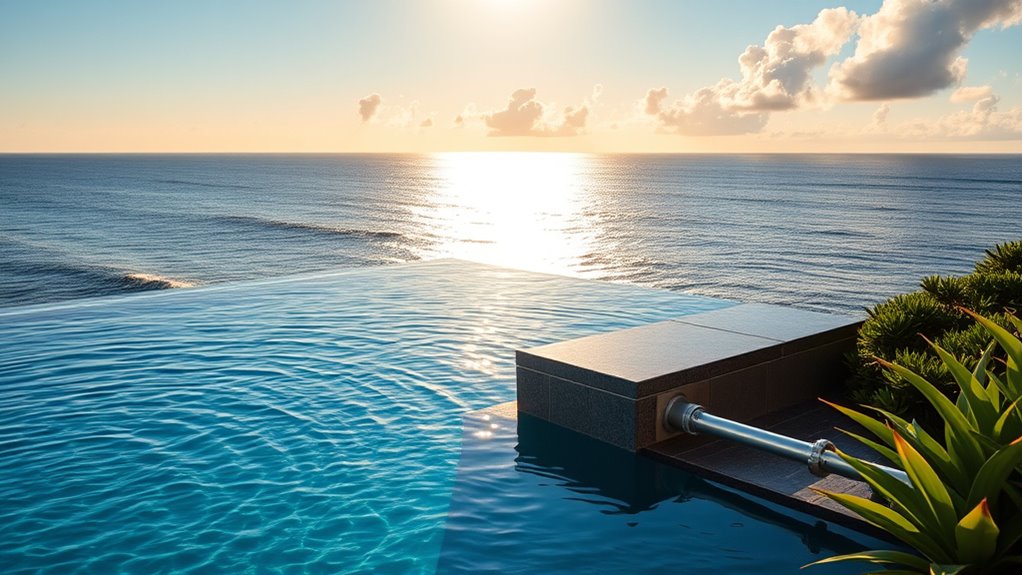
Switching to saltwater systems for infinity pools can considerably reduce your environmental footprint. First, saltwater pools generate fewer chemical byproducts, decreasing harmful runoff that contaminates local water sources. Second, they require less maintenance, reducing the need for harsh chemicals and their production’s energy use. Third, natural salt eliminates the need for transporting and storing large quantities of chlorine, lowering carbon emissions. Finally, saltwater systems promote healthier aquatic environments, supporting local ecosystems by preventing chemical pollution. By choosing a saltwater infinity pool, you’re making a conscious decision to lessen chemical waste, cut down on energy consumption, and protect water quality. It’s an eco-friendly upgrade that benefits both your pool experience and the planet.
Cost Considerations for Installing a Saltwater Infinity Pool

Installing a saltwater infinity pool involves significant upfront costs, but understanding these expenses can help you plan effectively. The initial investment includes excavation, construction, and specialized equipment like the salt chlorination system. Because infinity pools require precise engineering and high-quality materials, expect higher construction costs compared to standard pools. Additionally, the saltwater system itself adds to the budget, often ranging from a few thousand to over ten thousand dollars depending on the pool’s size and complexity. You’ll also need to contemplate permits, landscaping, and potential upgrades to your existing infrastructure. While the initial expense is substantial, many owners find that the long-term savings on chemicals and reduced maintenance costs balance out the investment over time. Proper planning ensures you’re financially prepared for this luxurious addition.
Maintenance and Upkeep of Saltwater Systems
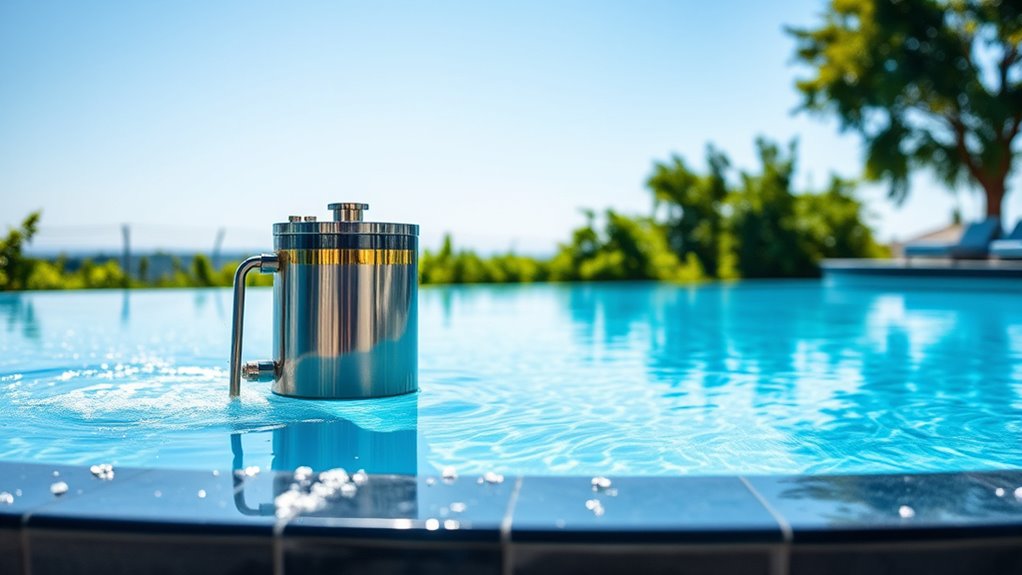
Maintaining a saltwater infinity pool requires regular monitoring and adjustments to guarantee the water remains clean and balanced. You’ll need to test the water frequently and fine-tune the salt levels, pH, and chlorine output. This ongoing effort can feel rewarding but demands consistency. Here are key tasks to keep your pool in top shape:
- Check salt levels weekly to ensure proper salt-to-water balance.
- Test pH and alkalinity daily to prevent corrosion or cloudiness.
- Clean the salt cell regularly to maintain chlorine production.
- Monitor for algae or debris and remove them promptly to preserve clarity.
Staying on top of these tasks gives you peace of mind and keeps your pool inviting and safe. Proper upkeep transforms your pool into a luxurious retreat.
Effects of Saltwater on Pool Equipment and Surroundings
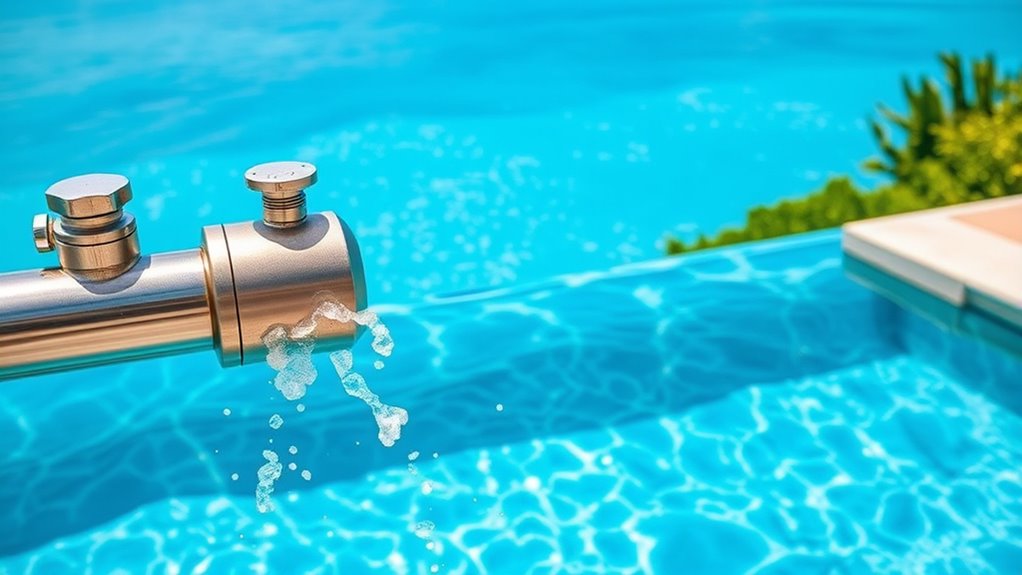
Saltwater can cause corrosion in your pool equipment and surfaces if you’re not careful. Over time, metal parts may deteriorate, and certain materials can suffer damage from the salty environment. It’s important to understand these risks to protect your infinity pool’s longevity and appearance.
Corrosion Risks to Equipment
Although saltwater systems offer many benefits for infinity pools, they also pose significant corrosion risks to equipment and surrounding structures. The salty environment aggressively attacks metal parts, leading to costly damage. You should be aware that:
- Your pool’s pump and filter may corrode faster, risking breakdowns when you least expect it.
- Metal fixtures, like ladders and handrails, can weaken and become unsafe.
- Nearby concrete and surrounding materials might suffer from salt-induced deterioration.
- The internal components of your salt generator could corrode, reducing efficiency and lifespan.
- Regular maintenance and protective coatings can help mitigate these corrosion risks, prolonging the lifespan of your pool components.
These risks can cause frustration, costly repairs, and safety issues. Protecting your investment means understanding and mitigating these corrosion dangers early on.
Surface and Material Effects
Saltwater’s corrosive nature directly impacts the surfaces and materials around your infinity pool. You’ll notice that metal fixtures, railings, and ladders may corrode faster than with traditional chlorine pools, requiring more frequent maintenance or replacements. Pool surrounds like stone, concrete, or wood can also suffer from salt buildup, leading to discoloration or deterioration over time. Salt can damage pool covers and decking, especially if they’re not designed to withstand it. To minimize these effects, use corrosion-resistant materials such as stainless steel, composite, or sealed stone. Regular cleaning helps reduce salt residue, preventing long-term damage. Being proactive about material choices and upkeep guarantees your infinity pool remains beautiful and functional, despite the challenges posed by saltwater’s effects. Additionally, selecting appropriate protective coatings can provide an extra layer of defense against salt-induced corrosion.
The Impact on Skin, Hair, and Overall Comfort

Saltwater pools can leave your skin feeling softer, but they might also cause dryness or irritation for some people. Your hair may become less prone to damage, yet it could still feel dry or brittle afterward. Consider how these effects impact your comfort and whether additional care is needed to enjoy your swim fully. Incorporating protective styling techniques can help mitigate some of these effects and enhance your overall experience.
Skin and Hair Effects
While saltwater systems are often praised for their lower chemical levels, they can still affect your skin and hair in noticeable ways. You might find your skin feeling softer, but some may experience dryness or tightness after swimming. Your hair could become less brittle, yet others might notice subtle changes like increased dryness or slight color fading. Here are some common effects:
- Smoother skin with less irritation, but occasional dryness if you have sensitive skin.
- Silkier hair that feels more manageable, yet possible dryness or dullness over time.
- Reduced chlorine smell, making your swim more pleasant, but not eliminating all residues.
- Overall comfort improves for many, though some might still experience slight irritation depending on their skin type.
- Saltwater exposure can also influence skin hydration levels, potentially leading to additional dryness for some individuals.
Comfort and Irritation
Although many swimmers find saltwater systems more comfortable than traditional chlorinated pools, individual reactions can vary. Saltwater pools tend to feel gentler on your skin, reducing dryness and irritation common with chlorine. You might notice your skin stays softer and less itchy after swimming. Hair may also benefit, as saltwater can help reduce dryness and frizz. However, some people with sensitive skin or allergies may still experience irritation or dryness, especially if the salt levels are high. Overall, saltwater pools often provide a more soothing swimming experience, but it’s important to monitor your skin and hair reactions. If you notice discomfort or irritation, adjusting your shower routine or using moisturizing products can help improve comfort and reduce any negative effects.
Comparing Saltwater to Traditional Chlorinated Pools
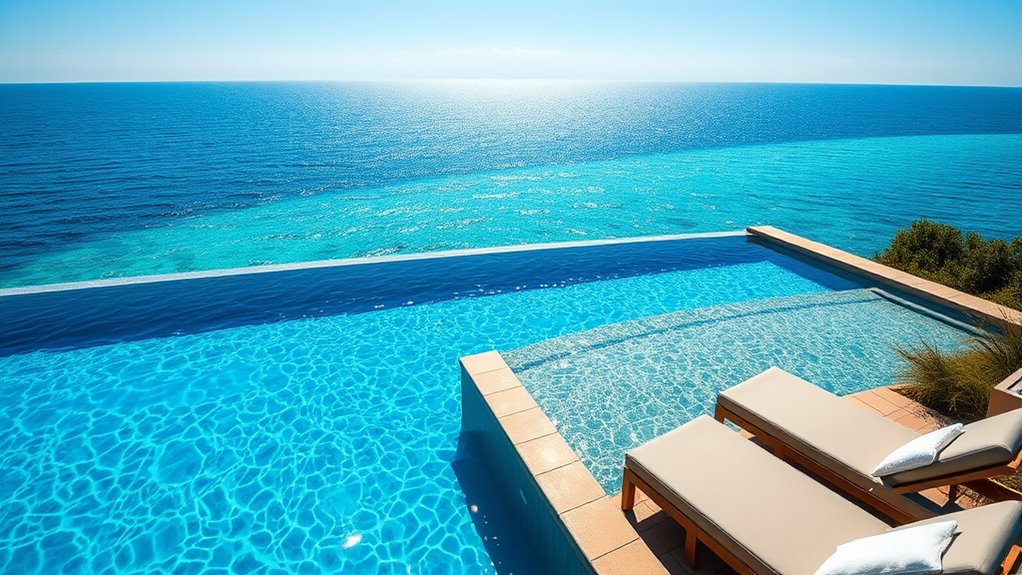
Ever wondered how saltwater pools stack up against traditional chlorinated pools? Here’s the real deal:
- You’ll enjoy softer, less chemical smell, making your swim more invigorating and less harsh on your skin.
- Saltwater pools often cost less long-term, since you’re not constantly buying chlorine supplies.
- Maintenance becomes easier, as salt systems generate their own sanitizer, reducing your hands-on time.
- The water feels silkier, creating a luxurious experience that invites you to linger longer.
- Additionally, the contrast ratio in saltwater pools can influence how vibrant and dynamic the water’s appearance feels, enhancing the overall swimming experience.
While traditional pools rely on added chemicals, saltwater systems offer a gentler, more natural feel. This switch can transform your pool into a soothing oasis, making every swim more enjoyable and less stressful.
Potential Challenges and Common Issues
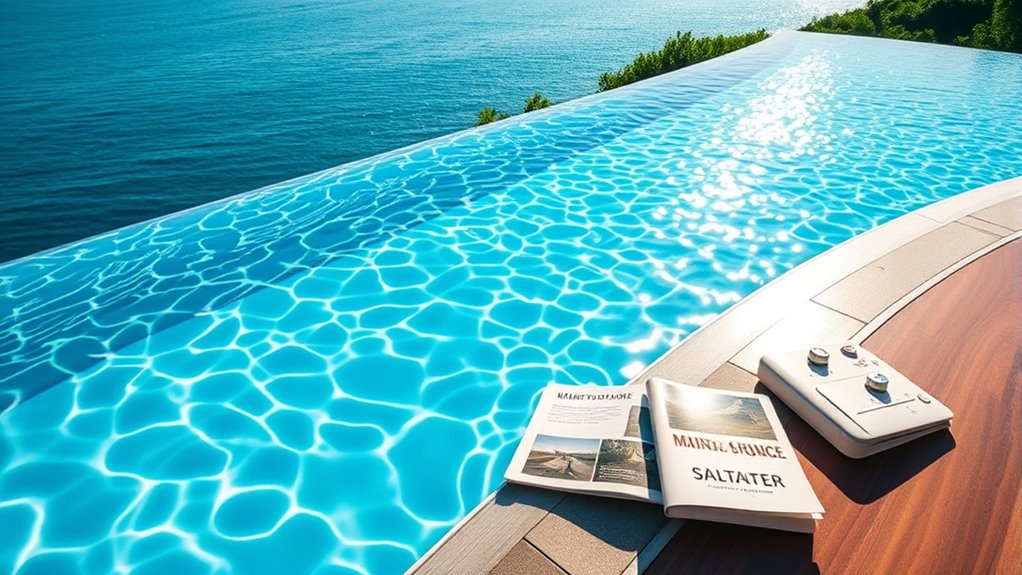
Saltwater systems can present several challenges that you should consider before making the switch. One common issue is corrosion; salt can damage pool equipment, ladders, and nearby metal fixtures if not properly managed. You might also face maintenance headaches, as salt cells need regular cleaning or replacement to keep the system running efficiently. Additionally, salt levels can fluctuate, leading to inconsistent water quality and potential skin or eye irritation. Some pool owners notice a distinct salty taste or smell that may be off-putting. Over time, salt buildup on surfaces can cause staining or deterioration, requiring extra cleaning. Lastly, initial installation costs can be higher than traditional systems, and not all pool components are compatible with saltwater, which could lead to unexpected repairs. Proper fraud prevention tools and regular monitoring can help safeguard your investment from potential damage and ensure system longevity.
Is a Saltwater System the Right Choice for Your Infinity Pool?

Deciding whether a saltwater system is right for your infinity pool depends on your priorities and willingness to handle potential maintenance and equipment concerns. If you crave a more natural, softer water feel and want to reduce chemical use, it might be perfect. However, consider these factors:
- Are you prepared for occasional equipment repairs or replacements?
- Do you want to avoid the harshness of traditional chlorine?
- Can you commit to regular system maintenance?
- Are you comfortable managing potential corrosion issues?
- Participating in hackathons like Hack’;n Jill can also be a great way to explore innovative pool technologies and solutions.
If your answers lean toward convenience, eco-friendliness, and a luxurious swimming experience, a saltwater system could be ideal. But if you prefer minimal upkeep and fewer technical worries, you might want to explore other options. Ultimately, it’s about aligning the system with your lifestyle and expectations.
Frequently Asked Questions
How Long Does a Typical Saltwater System Last Before Replacement?
A typical saltwater system lasts about 3 to 5 years before needing replacement. You might notice reduced effectiveness or increased maintenance costs as it ages. To extend its lifespan, regularly clean the cell and monitor salt levels. Proper care can guarantee your system functions well longer, saving you money and hassle. When it’s time to replace, upgrading to a newer model can improve efficiency and water quality for your infinity pool.
Can Saltwater Systems Be Installed in Existing Infinity Pools?
Yes, you can install a saltwater system in your existing infinity pool. First, you’ll need to confirm your pool’s plumbing and electrical systems are compatible. Then, you should drain the pool partially, install the salt chlorinator, and refill the water. It’s wise to consult a professional for proper setup and to avoid potential damage. Once installed, you’ll enjoy the benefits of softer, less chlorinated water.
Do Saltwater Pools Require Special Permits or Regulations?
You generally don’t need special permits to install a saltwater system for your infinity pool, but regulations vary by location. It’s best to check with your local building or zoning authorities to confirm compliance. Some areas may have rules about salt levels or water discharge. Consulting a professional installer can help you navigate these regulations smoothly, so you avoid potential fines or issues down the line.
Are There Any Health Risks Associated With Saltwater Pools?
Think of a saltwater pool as a gentle oasis—it’s generally safe, but some health risks exist. You might experience skin irritation or dry eyes, especially if your water’s salt levels are high or your pH balance is off. If you have sensitive skin, allergies, or respiratory issues, you should take extra care. Regular maintenance and monitoring help keep your saltwater oasis safe, soothing, and enjoyable for everyone.
How Does Climate Affect the Performance of Saltwater Systems?
Climate critically impacts your saltwater system’s performance. In hot, sunny weather, evaporation increases, meaning you’ll need to top off the pool more often, which can alter salt levels. Cold temperatures can slow down the system’s efficiency and make saltwater less effective at sanitizing. Humidity also affects evaporation rates and chemical balance. You should regularly monitor and adjust your system to guarantee peak operation regardless of climate conditions.
Conclusion
Ultimately, choosing a saltwater system for your infinity pool depends on your priorities. While it offers environmental and comfort benefits, it also comes with maintenance and cost considerations. Remember, “look before you leap”—doing thorough research guarantees you make the best decision for your oasis. Weigh the pros and cons carefully, and you’ll create a stunning, enjoyable pool that fits your lifestyle perfectly.



